
Come feel it! It’s here!
On Saturday 3 July, ikamvanites from the Makhaza, Nyanga and Masiphumelele branches will be expressing themselves, showcasing their talents and having fun, following weeks of intensive hard work at their respective winter schools.
This year, our theme is FIFA Fever, which focuses on the soccer spirit of the townships and its effect on the learners. We wish to showcase the skills of our learners and our volunteers in many different ways such as poetry, song, dance, and photography. The World Cup has asked each South African: “Can you feel it? It is here!” We at IkamvaYouth have also asked our learners this, but with a twist.
“Can you feel it? It is here!”
Your Success. Take it. It is here, and it is yours to take.
We invite everyone to our Talent Show & Photography Exhibition, and encourage you to attend our event and support and celebrate our learners and volunteers. Photographs taken by our learners will be on display. With a small donation to IkamvaYouth, you will have the opportunity to order a photograph taken by one of our learners. Your support goes directly to the future of IkamvaYouth and its learners. We thank you for your support!
Bring your vuvuzelas and join in the ayoba celebrations at the Desmond Tutu Hall (near the Nazeema Isaacs library, cnr Lansdowne and Cekece Roads in Makhaza, Khayelitsha) from 9am to 1pm.
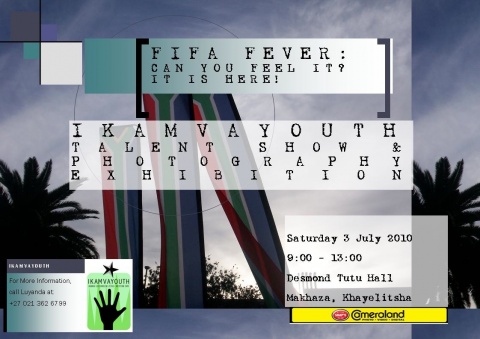 Photograph courtesy of Nosicelo Tshakeni
Photograph courtesy of Nosicelo Tshakeni
A horrible thing happened at the end of an amazing Winter School here in Gauteng – the taxi transporting the even more amazing volunteers crashed on the M1 Highway. Thankfully no-one was seriously injured beyond some cuts, scrapes, bruises and stitches. It was a frightening experience and many of our volunteers woke up this morning (Saturday) very tender and very sore but grateful to be alive.
As part of the IkamvaYouth family, we all hurt when any one of us hurts and our thoughts are with all the Ikamvanites involved. May the recovery be speedy!!!
Feel free to leave messages of support in the comments section below.

IkamvaYouth’s annual winter schools launched on Monday 14th June 2010. Amidst much flag-waving and vuvuzela blowing, ikamvanites (IkamvaYouth’s inspiring learners and volunteers) are closing the gap created by an unequal education system in crisis.
Over 500 learners from some of South Africa’s most disadvantaged areas – Khayelitsha, Masiphumelele and Nyanga (in the Western Cape), Ebony/Ivory Park (in Gauteng) and Molweni and the greater Cato Manor area (in KZN) – are spending 2-weeks getting the grades, information and support they need to access tertiary education and employment. Joining them are over 100 volunteer tutors, mentors and workshop facilitators. IkamvaYouth’s volunteers are mostly university students (many of them former IkamvaYouth learners), as well as international volunteers (from Brazil, USA, France and England) and subject specific professionals. Some winter schools could really do with more tutors (the more tutors, the better the tutor:learner ratio; Ikamva aims for a 5:1 ratio, but is not reaching this target at all the winter schools.
IkamvaYouth is holding five holiday programmes, hosted by 3 universities – University of the Wetsern Cape (UWC), TSiBA, and Durban University of Technology (DUT) – the Masiphumelele library and the Siyakhula Centre in Ebony Park. All have generously availed their facilities and support free of charge. Very Ayoba!
“IkamvaYouth is a by-youth, for-youth innovative grassroots response to South Africa’s education crisis. The Ikamvanites give us hope and make us feel inspired and proud,” says IkamvaYouth chairperson Leigh Meinert.
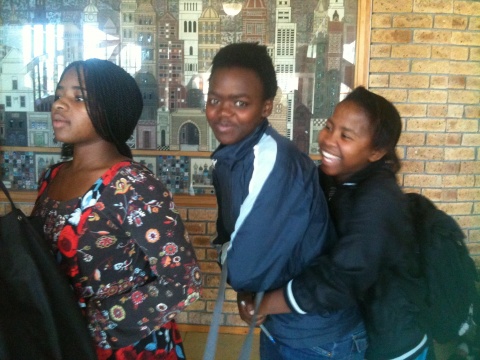
The schedules are packed with small-group tutoring sessions and up to six different workshops occurring at each winter school simultaneously. During the mornings, the focus is intensive academic intervention which is critical for improving learner achievement. Tutors work with learners in small groups, and provide real-time feedback in response to areas of difficulty identified through mock exams and testing. The afternoons are filled with a range of enriching workshops and excursions. This year, ikamvanites are engaging in computer literacy classes, science pracs and workshops on a range topics including leadership developoment, HIV-awareness, creative writing, photography, debating, yoga and numerous other interesting activities such as online video conferences with Brazilian youth (the next hosts for the World Cup 2014). Learners will go on excursions to interesting places including Kirstenbosch Gardens and the Sci Bono centre. They will attend and participate in talent shows, photography exhibitions and soccer matches.
More impressive than the scope and quality of programme delivery are IkamvaYouth’s results. In a country where the far majority of learners achieve far below grade level, IkamvaYouth’s matric pass rate has been between 87% and 100% each year since 2005. More than 70% of the last two matric groups gained access to tertiary education (compared to the township average of around 5%).
“South Africa’s education challenges are not insurmountable”, says IkamvaYouth co-founder Joy Olivier. “The world has watched us build world-class stadiums, and I’m hoping it will continue watching as we ensure our schools have libraries, science labs and windows.” While the World Cup highlights South Africa’s extreme inequality and contradictions, it is also bringing people together. It’s reminding us that amazing things happen here, of our unity and the fact that we can make a massive, consistent noise with vuvuzelas. We’re not only hosting the world, we’re developing the people who are going to make it a better place.
To get a sense of the vibe, watch this short film made at last year’s winter school in Gauteng:
[youtube]V9LPb6Qw2M8[/youtube]
To be a part of this life-changing experience, contact the coordinator of the branch closest to you. To see what’s happening there, download the schedules for:
Final_Schedule_2010_Makhaza_at_Tsiba.pdf
Masiphumelele_winter_school_schedule.pdf
NyangaWinterSchoolUWC_2010.pdf
Cato Manor winter school held at DUT
IY_Gauteng_Winter_School_Holiday_Programme_June_2010.pdf

Today Molly Blank screened her powerful film Where Do I Stand? At the Nyanga branch’s winter school at UWC.
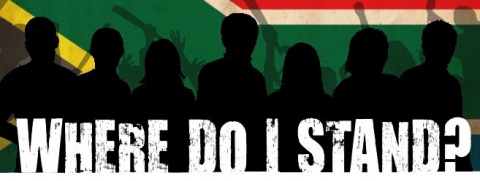
“When xenophobic attacks broke out across South Africa in May 2008, many found themselves caught off guard, shocked by violence that felt like a violation of the principles of their newly democratic nation. In the midst of this violence, many young people, clad in the bright greens and maroons of their school uniforms, looted neighborhood shops while some of their classmates, refugees themselves, fled to safer ground. Some youth tried to find a way to help, but still more stood by, watching from their windows or on television. Where Do I Stand? captures the optimistic voices of youth trying to make sense of what they experienced and the choices they made during the violence…” (wheredoistandfilm.com).
Ikamvanites were very moved and thought-provoked after the screening, and shared their ideas and opinions with Molly. Branch coordinator Nombuyiselo Dziba urged the learners to stand up in their communities, as although they are young, they are priveleged with the education they’re receiving, and can lead their communities to think differently.
Zandile Zoya, a grade 11 learner, wrote an on-the-spot poem during the few minutes learners were given to reflect in silence once the film had ended. Watch her read her poem, “What’s the Point?”:
[youtube]kietiAX_zko[/youtube]
Three grade 11 ikamvanites shared their views on xenophobia, and suggest that the film is screened on SABC1 to prevent further outbreaks which many communities are threatening for post-world cup:
[video:http://www.youtube.com/watch?v=VOXN89u1Hj8]
“Where do I stand?” will be screened and discussed at all five winter schools.

South Africa houses more than the 11 major languages spoken here, but English is the prescribed universal for teaching and testing within the faltering educational system. In the Western Cape, a vast majority of our learners are native isiXhosa speakers – English is their 1st or even 2nd Additional Language course manadatory for all high school students. Speaking English is one thing; a non-native speaker can communicate in broken English their meaning well enough in rudementary form. Instructors are mandated to teach their lessons in English, but this is not always the case in township schools where learners are already struggling with initial concepts in all subjects, compounded by the struggle to translate from English to their native language. Solution? Stop teaching as frequently in English. Yet there’s a few problems with this: homework assignments for all classes are given in English; textbooks are written in English; exams are written in English.
When I first joined IkamvaYouth as an intern and tutor, I quickly realised that our learners were struggling to answer questions dealing with analysis simply because they didn’t know what the question was asking them. Their low reading comprehension skills and basic lack of knowledge on how to use referencing materials became overwhelming. Our learners can speak English because it’s in the music they listen to, the television they watch, and they use it with those from outside of their communities. But can non-native English-speaking South Africans read and write English to the proficiency standards set by National exams? Simply, the answer is no.
The English Reading Project at IkamvaYouth is set out to address this issue. On Saturdays I work soley with grade 9 learners to help them understand the fundamentals of the English language: grammar and sentence structure. I know, it makes even the strongest of hearts cringe at the thought. Almost every week my learners spend about 15 minutes writing on a topic of my choosing. The next week, their papers are returned with corrections to punctuation, spelling, and grammar notated as well as feedback. The rest of the class period is spent learning about different parts of speech, what their roles are in sentence structure, and grammar rules associated with the many irregularities that come with writing in the English language. Reference materials such as the dictionary and encyclopedia are also introduced and encouraged for learners to use. From where we started at the beginning of the year, the results seen in their writing are astounding, and it makes me excited to see how this carries on with them through their exams and onwards to matrics.
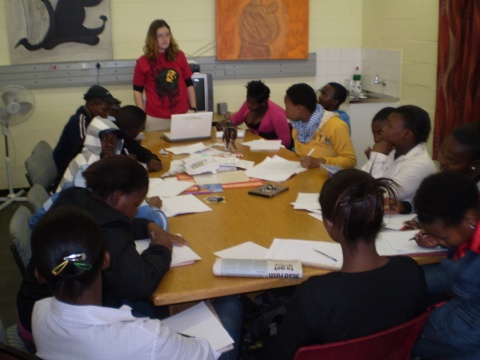
Recently, I asked them to write about their impressions of IkamvaYouth and what they’ve learned. I’ll let them speak for themselves:
When I first saw the Ikamva advertisement, I thought of being helped through everything I didnt know or understand. I was very happy, without lying, because it was an honour to see/understand that there are still people who care about us people who need their help. Ikamva’s people improved my marks at school; now I can write or spell words correctly in a good way. Also, now I somehow know how to do maths, use the computer, and I have developed through learning here. It’s very fun too, because you get to go to places you never thought you would go to, meet new people and learn about who they are, and so on.
It’s very important to me to attend Ikamva because they are the people who make a difference in my life in such a way that thay made me who I am. I am able to speak English properly and learn more about our country by going to Table Mountain. There are people like tutors who come here to teach us instead of being with their families or do their own work. That is truely amazing of them. All I can say to them is may God give them more strength and power to always carry on with what they are doing…
-Nwabisa Mtumtum, Grade 9
This is me, Thabo, as the face of IkamvaYouth. This is where I belong. This is where you build up education and your future. I heard people speaking about this program. I thought I should try what they are trying and bring myself to IkamvaYouth to be one of the members that work very hard for their future. So for me being here is a success, and I still want to be here since Ikamva has now become a family to me. I respect what I am doing at IkamvaYouth.
Let me give you advice: If you have a goal in your life, just go for it and it will be a success. Success starts now – not tomorrow, now. So guys, I am aiming at something big with my life, and I want it to be a success. If I fight for it, it will happen, I can feel it. It is here.
-Thabo Charlie, Grade 9
From IkamvaYouth, I learned how to work with other people and how to communicate with them. It has been a great experiment for me, and it’s also helping me with my school work or my assignments. It wasn’t my thing to come to the library during the week and Saturdays, it’s boosting me to do my school work regularly. I’m glad that I received a great opportunity to attend classes here. It’s really helping me with my assignments and my school marks are improving as well.
-Phozisa Mbovane, Grade 9

On 22nd May 2010, IkamvaYouth in Makhaza hosted an HIV/AIDS awareness activity in which New Start and Youth AIDS offered their services to our learners and the community. Youth AIDS is an organisation targeting youth in and out of school in the age group between 16-24 years old. This time around they came to introduce themselves to the learners saying, “We are going to work with you fully and well-equipped during the Holiday Programme.” They are really enthusiastic to work with our learners.
On the other hand, New Start is an organisation that does voluntary counselling and testing while targeting all age groups. They arrived around half past ten in the morning and set up their apparatuses. While tutoring was in continuing, the voluntary counselling and the testing was rolling outside offering their services to the community members from around Makhaza and the tutors who were not engaged at the moment. After tutoring many of our learners joined the queue, and I must say it was amazing to see our learners brave enough to test in large numbers. This was a very successful day for HIV Awarness and testing for our learners. 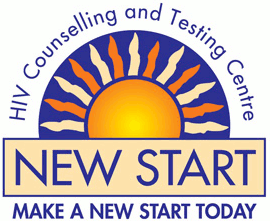

-Bopane Lephoto
Head of HIV/AIDS, Makhaza

 Photograph courtesy of Nosicelo Tshakeni
Photograph courtesy of Nosicelo Tshakeni





 Lloyd Lungu
Lloyd Lungu